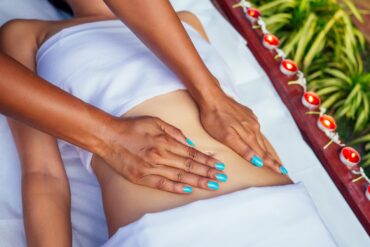Do you constantly struggle to keep your eyes open when you’re riding the bus home from work?
Maybe you’ve been popping OTC (over-the-counter) pills to help you sleep at night, but the side effects are leaving you drowsy and disoriented during the day.
Whatever’s happening, you know that your sleeping pattern isn’t what it should be — and that’s a real problem.
After all, no matter who you are, or what you do, all living creatures need sleep to survive. We use sleep as one of our bodies most crucial fuels — along with oxygen and food.
Fail to get enough sleep into your daily schedule, and you could suffer from a list of terrifying side-effects, ranging all the way from increased chances of chronic illness, to depression.
The question is, how do you know the difference between just being a little sleepy, and being significantly sleep deprived?
It’s easier than you’d think.

Sleep deprivation test #1: The spoon method
Do you constantly struggle to keep your eyes open when you’re riding the bus home from work?
Maybe you’ve been popping OTC (over-the-counter) pills to help you sleep at night, but the side effects are leaving you drowsy and disoriented during the day.
Whatever’s happening, you know that your sleeping pattern isn’t what it should be — and that’s a real problem.
After all, no matter who you are, or what you do, all living creatures need sleep to survive. We use sleep as one of our bodies most crucial fuels — along with oxygen and food.
Fail to get enough sleep into your daily schedule, and you could suffer from a host of terrifying side-effects, ranging all the way from increased chances of chronic illness, to depression.
The question is, how do you know the difference between just being a little sleepy, and being significantly sleep deprived?
It’s easier than you’d think.
Here’s your introduction to sleep deprivation tests, and how they work.
Sleep deprivation test #1: The spoon method
We often assume that studies into our sleeping mechanisms are going to be very complex.
Say the words “sleep test” to someone, and the immediately imagine electrodes and beeping machines. However, the most common sleep deprivation test is a lot simpler than you’d think.
Designed to help anyone determine just how problematic their sleep schedule might be, the Sleep Onset Latency Test was created by a man named Nathaniel Kleitman.
If you’ve been having trouble with your sleep for a little while, your doctor might suggest using this test before you sign up for a full sleep study.
Though the guidelines for this test sound a bit silly — don’t worry. The whole thing is based on science, and it comes from a University professor — so you know it’s the real deal.
All you need to do to take this sleep deprivation test is lie down in a quiet, dark room, in the early afternoon. You hold onto a metal spoon, dangling your arm (and the spoon) over the edge of your bed.
Place a metal tray on the floor beneath your hand and check the time. Close your eyes and allow yourself to drift off naturally.
The idea is that when you do eventually fall asleep, your fingers will relax, and you’ll let go of the spoon. The metal utensil clanging against the tray you’ve placed on the floor will cause you to wake up.
At that point, you can check the time, and see how long it took for you to fall asleep.
Ideally, you shouldn’t be falling to sleep as soon as you lie down — particularly not in the middle of the day.
If you drift off within five minutes of lying down, then this indicates that you’re severely sleep deprived, and you need to repay some of your sleep debt.
Take ten minutes to get to sleep, and you’re a little deprived — perhaps in need of a good night’s kip.
If it takes you longer than 15 minutes to get to sleep, you’re probably fine.
If you’re concerned that you’ll turn over when falling asleep and drop the spoon on your bed or sofa, then you can try a different version of the test.
For instance, just set an alarm for fifteen minutes, and find out if you drift off before it goes off.
You won’t know exactly how long it took you to get to sleep this way, but you’ll have some indication of whether you’re sleep deprived.

Sleep deprivation test #2: The sleep deprivation EEG test
There are a few problems with the spoon sleep deprivation test.
You could drop your spoon, and it could hit the carpet instead of the tray, which means you don’t get woken up.
You could set an alarm that fails to go off, or something else could disrupt your results. Scientists are working on finding better ways to test sleep deprivation.
In the meantime, there are some other ways that doctors and scientists can get an idea of what’s going on in your brain when you’re sleeping.
For instance, if your doctor wants to know what’s going on with your brain waves, they’ll usually recommend an EEG.
A sleep deprivation EEG test is usually reserved for people with epilepsy. It allows doctors to see if seizures happen in the brain when a person is sleeping. Or if their brain acts normally during a daytime EEG.
In certain cases, however, a sleep deprivation EEG test could also be used as part of a comprehensive sleep study.
If you’re asked to take part in a sleep study, then you may be required to stay awake for much of the night before. This will help the doctors see what happens to your brain when it’s sleep deprived.
Alternatively, some doctors may simply want to see if anything is happening in your brain during a regular night of sleep.
Either way, don’t worry too much about the electrodes used in an EEG test. These tools are designed to pick up on the electrical signals that happen in your brain all of the time.
Although they might look strange, they’re not going to cause you any pain or damage.
By measuring the waves of your brain and comparing them to the brain waves of other people, scientists can determine whether you’re having a healthy night’s sleep or not

Sleep deprivation test #3: Blood tests for sleep deprivation
In recent years, as interest in sleep in the role it plays in our wellbeing has increased. Experts have begun to suggest multiple new ways of defining and understanding sleep deprivation.
Scientists from the Sleep Research Centre in the University of Surrey have begun working on a blood test that indicates sleep deprivation.
This might not be the most appealing sleep deprivation test for people who aren’t fond of needles. But the could offer experts a better insight into what’s going on with your body if you’re struggling to sleep.
According to the report from the University of Surrey, it’s difficult to independently assess how much sleep any person has had at any given time.
Now that we know being sleep deprived can be just as dangerous on the road, as being drunk. This means that police officers and lawyers have something else they need to consider when determining if someone is responsible for an accident.
We already have blood tests that indicate how much alcohol or drugs a person have in their system. The researchers from Surrey believe that we could build on those tests to see whether a person is sleep deprived too.
The scientists in the report, led by a Professor named Derk-Jan Dijk, worked with 36 people who had all skipped a full night of sleep the day before.
The volunteers stayed awake for a total of 40 hours before entering into the study, providing blood samples for the scientists.
After the test, the professor and his colleagues examined the changes in various sets of genes that were detected in the blood samples.
Ultimately, the group identified 68 genes whose expressions were affected by a lack of sleep. The team were also able to determine with 92% accuracy which of their volunteers were sleep deprived.
This sleep deprivation test proved that there are biomarkers in the body and the blood that can highlight how exhausted a person is — even after only 24 hours of sleep deprivation.
Tests like this one could be incredibly helpful when diagnosing people affected by chronic sleep deprivation.
Additionally, it could help police officers and legal professionals to determine who was legally at fault for certain accidents on the road.

Are you sleep deprived?
Getting the answer to “are you sleep-deprived?” isn’t as simple as it seems.
The common symptoms of sleep deprivation, like exhaustion, trouble concentrating, or emotional intensity could be caused by a range of other issues.
You may have just had a single night of poor sleep, or perhaps you’re feeling burned out at work, and that’s causing feelings of stress and depression.
Because of this, it’s important to identify for certain whether sleep is really at the heart of your problems before you begin seeking professional help. Your doctor can provide you with plenty of advice on how to measure sleep deprivation.
Some will even recommend keeping a sleep journal, so you can track how easily you fall asleep each night and keep an eye on your dreams.
Other doctors may encourage you to take part in sleep studies.
While a sleep deprivation study can be a little worrying at first, it’s often the best way to give your medical professionals an in-depth insight into what’s going on with your brain and body when you sleep.
Many studies will look not just at your brain rhythms with an EEG, but also at things like muscle movement, indicating restless leg syndrome, or oxygen levels which could indicate sleep apnea.
With a full sleep study, some doctors could even determine whether things like pain, anxiety, nightmares, or trouble with the temperature of your bedroom are causing a bad night’s sleep.
The more you know, the easier it is to build a customised treatment strategy that actually works for you.
In the meantime, if you’re awaiting a full consultation with your doctor, it helps to know that there’s a sleep deprivation test that you can take at home.
Doing your own research could mean you have more data to offer your doctor at your next appointment.
Try the spoon test for yourself and check out the other articles here at Siestio for extra guidance.
Siestio. Sleep Matters.
Medical disclaimer
You must not rely on the information provided on our website as an alternative to medical advice from your doctor or other healthcare professionals. For more information read our full disclaimer here.




